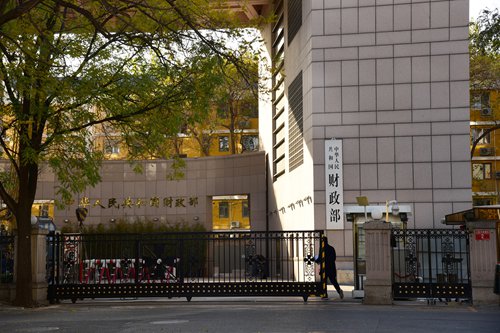Drop in local government fiscal income growth mainly due to economic support policies: official

Ministry of Finance in Beijing Photo: VCG
The drop in fiscal income growth for many local governments has mainly been caused by implementation of tax reduction policies, as China has sacrificed a certain amount of fiscal revenue for the sake of market vitality and supporting businesses amid recent economic challenges, a government official from the Ministry of Finance (MOF) said on Tuesday during a press conference.
In the first four months this year, China’s fiscal revenues increased by 5 percent year-on-year, compared with 8.6 percent growth in the first three months, said Xu Hongcai, deputy head of the MOF.
Xu attributed the drop to China’s tax cuts and reimbursement policies. Xu said China would reduce and return taxes amounting to about 2.5 trillion yuan this year, with incremental value-added tax (VAT) credit refunds accounting for 1.5 trillion yuan.
While the policies have helped to ease the burden on companies, they have also trimmed government fiscal income.
April was the first month that China implemented VAT credit refunds on a large scale. The refunds amounted to about 800 billion yuan in April, accounting for about 37 percent of government revenues, Xu disclosed.
This means that China’s fiscal revenues will have to drop 37 percent in April in general. In certain regions where manufacturing is advanced, such as eastern China, the decrease is even larger, Xu said.
Many cities in East China's Jiangsu and Zhejiang Provinces saw double-digit year-on-year drops in government revenue in April, including Suzhou, Hangzhou and Ningbo.
Apart from the influence of VAT tax cuts, China also has other forms of tax and fee reduction policies amounting to about 1 trillion yuan. Those measures, along with other tax policies, have eaten into the country’s fiscal income in the first four months.
Local governments also spent more money during the period to safeguard economic growth. The country’s general public budget expenditure increased 5.9 percent year-on-year in the first four months, with key areas like employment, technology and education seeing increasing government expenditure.
China also arranged 1.11 trillion yuan of local government special bonds during the period – up 1 trillion compared with the corresponding period last year – to expand investment and stabilize the macro economy.
Xu also stressed that the central government has made up for the local government fiscal income reduction with methods like payment transfers.
According to Xu, the fundamentals of stable and long-term improvement of China's economy have not changed, so local government fiscal income will rebound stably.
